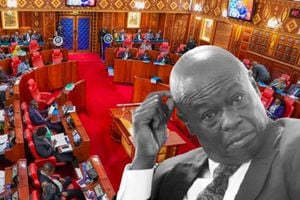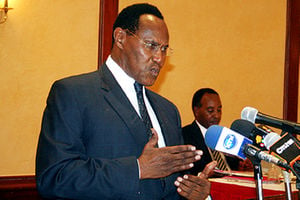Son seeks Gaddafi's ouster: reports

An image grab taken on February 20, 2011 off Libya's state television station shows a televised address by Libyan leader Muammar Gaddafi's son, Seif Al-Islam. PHOTO / AFP
WASHINGTON
At least two sons of Libyan leader Muammar Gaddafi are proposing a transition to a constitutional democracy that would include their father's removal from power, The New York Times reported late Sunday.
Citing an unnamed diplomat and a Libyan official briefed on the plan, the newspaper said the transition would be spearheaded by one of Gaddafi's sons, Seif al-Islam el-Kadhafi.
It is not clear whether Colonel Gaddafi, 68, has signed on to the reported proposal backed by his sons, Seif and Saadi el-Kadhafi, the report said.
But one person close to these sons said the father appeared willing to go along, the paper noted.
The two sons "want to move toward change for the country" without their father, The Times quoted one person close to the Seif and Saadi camp as saying.
"They have hit so many brick walls with the old guard, and if they have the go-ahead, they will bring the country up quickly."
According to The Times, the idea may reflect longstanding differences among Gaddafi's sons.
While Seif and Saadi have leaned toward Western-style economic and political openings, Colonel Gaddafi's sons Khamis and Mutuassim are considered hard-liners, the paper said.
Khamis leads a pro-government militia, the report noted. And Mutuassim, a national security adviser, has been considered a rival to Seif in the competition to succeed their father.
Meanwhile the United States agreed to extend air strikes in Libya into Monday as the oil town of Brega saw heavy fighting, with rebel forces advancing only to fall back after an ambush by forces loyal to Gaddafi.
The US air strikes, part of a coalition effort to protect civilians from Gaddafi's forces, would continue through Monday at NATO's request, because of "recent poor weather in Libya," the Pentagon said on Sunday.
The US military had planned to begin withdrawing its combat jets and Tomahawk missiles from the air campaign against Libya's regime this weekend, as NATO allies were to take the lead in bombing Gaddafi's forces.
And, Gaddafi was hit by another defection.
Former foreign minister and UN General Assembly president Ali Treiki became the latest official to abandon Kadhafi, after the flight to Britain of foreign minister and regime stalwart Mussa Kussa days earlier.
A British delegation was also reported to be in the Libyan rebel bastion of Benghazi in the east, nearly a month after a botched bid by special forces to contact the insurgency caused red faces in London when the team was captured.
Rebel spokesman Mustafa Gheriani confirmed the presence of a British group in the country's second largest city for talks with the Transitional National Council (TNC) on Sunday.
A British Foreign Office spokesperson also confirmed the trip, saying the team was led by Christopher Prentice, who also visited Libya last week.
The spokesperson said the aim of the trip was to "engage with key figures" on the TNC, "build on the work of the previous team and seek to establish further information" about the council and its aims.
On March 7, London called the seizure by rebels of a team — reportedly six elite Special Air Service troopers and two diplomats — in a botched attempt to contact the insurgency the result of a "serious misunderstanding."
Kadhafi's foreign affairs secretary of state, Abdelati Obeidi, was in Athens to meet Greek Prime Minister George Papandreou Sunday "at the request of the Libyan prime minister," Al-Baghdadi Ali al-Mahmudi, Papandreou's office said.
On the front line, rebels who had entered the eastern town of Brega early on Sunday said they were staging a tactical withdrawal after being ambushed.
An AFP correspondent saw some 300 to 400 fighters regrouping on the road back into rebel-held territory some 10 kilometres (six miles) to the east. (AFP)




